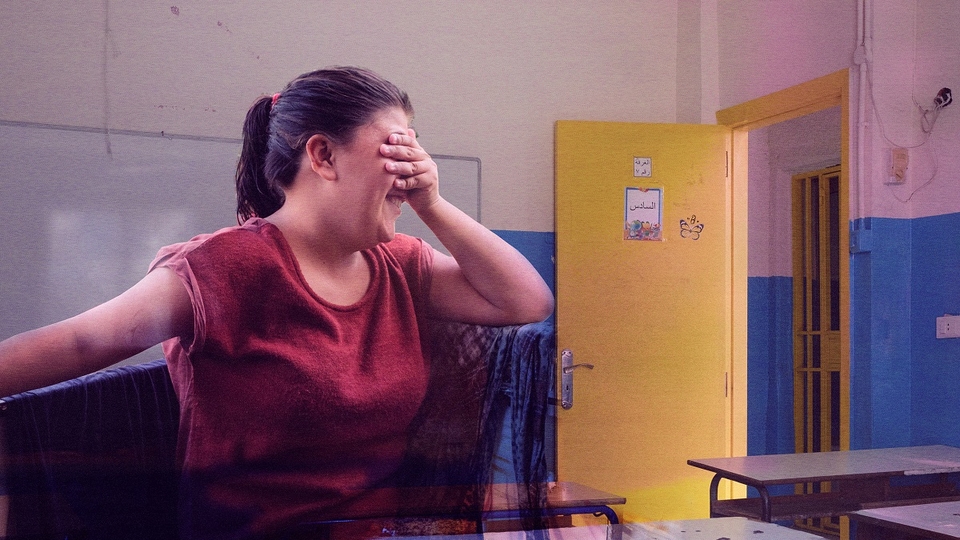Public Education: Thousands of Children Left Behind at the Start of the School Year
Maya and Diana met in seventh grade and immediately became friends. For the past five years, they’ve done everything together: after school, when they don’t have homework, they go to each other’s houses or visit public libraries and parks. On a sunny late September day, as the beginning of the school year approached, the two best friends sat on a bench in Sanayeh Garden, their backpacks next to them, immersed in conversation and laughter.
But these days there’s an invisible distance between them: Diana is leaving the public school where she and Maya have been studying for the past five years. Maya is staying.
Diana, a soft-spoken 17-year-old, doesn’t want to leave her best friend behind. But over the past three years, public education in Lebanon has deteriorated so drastically that it was impossible for her — and hundreds of thousands of other children — to obtain a basic education within the public system. “I’m moving, not because I want to leave, but because I have to,” she says. “There’s no education anymore.”
Maya, a bright-eyed 16-year-old, agrees. Over the summer, she tutored third and fourth grade students. She saw firsthand how the dire situation in public schools was affecting children younger than the two teenagers. Amid three years of pandemic, economic crisis, and recurrent teachers’ strikes, public schools are in crisis, and her pupils were years behind where they should have been. “They don’t know how to read and how to write,” she says. “They don’t even know the alphabet.”
But unlike Diana, Maya’s family can’t afford to switch to private school. So she’s staying — even though she knows she won’t learn much this year. “Tuition at private schools is in dollars, which is millions of liras, and my parents can’t pay for that,” she says. “So I have to stay and bear with the situation for my last year. What else can I do?”
Maya is not alone. Most private schools now charge tuition in U.S. dollars, either fully or partially. The steep hike in tuition fees is pushing people to migrate en masse from private to public schools, despite the worsening conditions of public schooling. But while tens of thousands of children have been transferring to them for the past three years, public schools have barely been operational.
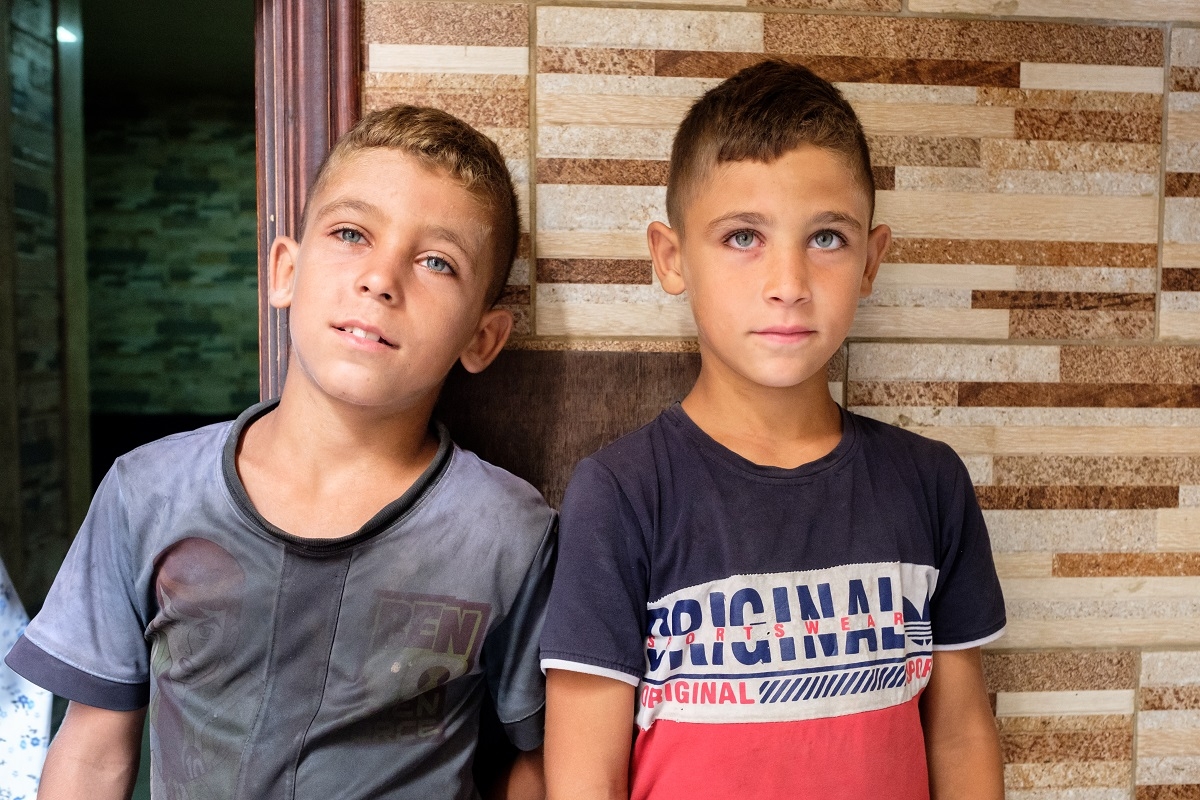
Brothers Jawad, 9, and Zein, 7, on their home’s small front stoop. Jawad works at a mechanic shop and Zein spends his days playing, but they want to go back to school. Tripoli, Lebanon. September 19, 2022. (Rita Kabalan/The Public Source)
Between the fall of 2019 and the spring of 2021, the total number of students enrolled in public schools increased by 42,438. At the same time, private schools saw a total decrease of 73,124 pupils — students in paid private schools decreased by 43,080 and students in charter schools decreased by 16,750 — and UNRWA schools saw an increase of 1,522 pupils. The total number of students enrolled in schools in Lebanon, whether public or private, decreased by 15,870 in the span of two years.
The 2019-2020 academic year is when everything changed: after the start of the October 17 uprising in 2019, schools closed on and off for almost two months. Then, on February 28, 2020, the government shuttered schools and imposed a strict lockdown due to the COVID-19 pandemic, halting in-person classes until the end of the school year. Public schools were open for just 34 days from the beginning of the 2020-2021 academic year until March 31. A year ago, UNICEF warned that education in Lebanon was “at a tipping point.”
As the new academic year begins, Maya and thousands of other children are entering a fourth year in a barely functioning school system. Most educators we spoke to say they don’t think schools will be fully operational — if at all.
How Did We Get Here?
The government and the Ministry of Education and Higher Education (MEHE) are failing to distribute allocated school budgets that barely support public schools and their staff while banks are playing a role in keeping public schools’ funds out of reach.
Just like individuals' deposits have remained trapped since 2019, Lebanese banks have restricted public schools’ access to their own accounts.
Siham Antoun, a secondary school teacher and activist, says the education and finance ministries have been in talks to raise schools’ bank withdrawal limits, but “this is often not implemented, and when it is, it's not enough”.
The banks’ measures have pushed school directors to make changes to the way their schools operate. Directors would have previously used the now-withheld funds to keep their schools functional and ready to receive students. But today they struggle to pay for electricity, heating, water, Wi-Fi, telephone bills, office supplies and stationery, janitors’ rent, etc.
A public school director, who requested anonymity for fear of retaliation by the Education Ministry, tells The Public Source about the struggles their school has been facing. “Over the past 3 to 4 years, we haven’t received a single lira from the government.”
They said that they have been dependent on funding from different non-governmental organizations, such as UNICEF and Qitabi. “Had it not been for the organizations, our school would not have been able to get going last year,” they said. “Not a chance.”
The Ministry of Education does not allow school directors to speak to the media without an official permit. When The Public Source reached out to obtain a permit, ministry spokesperson Albert Chamoun said the ministry was “entering a period of silence.” He then added: “There is no need for anyone to talk about this anymore, because everything that has to be said about it was said, and there's nothing more to add.”
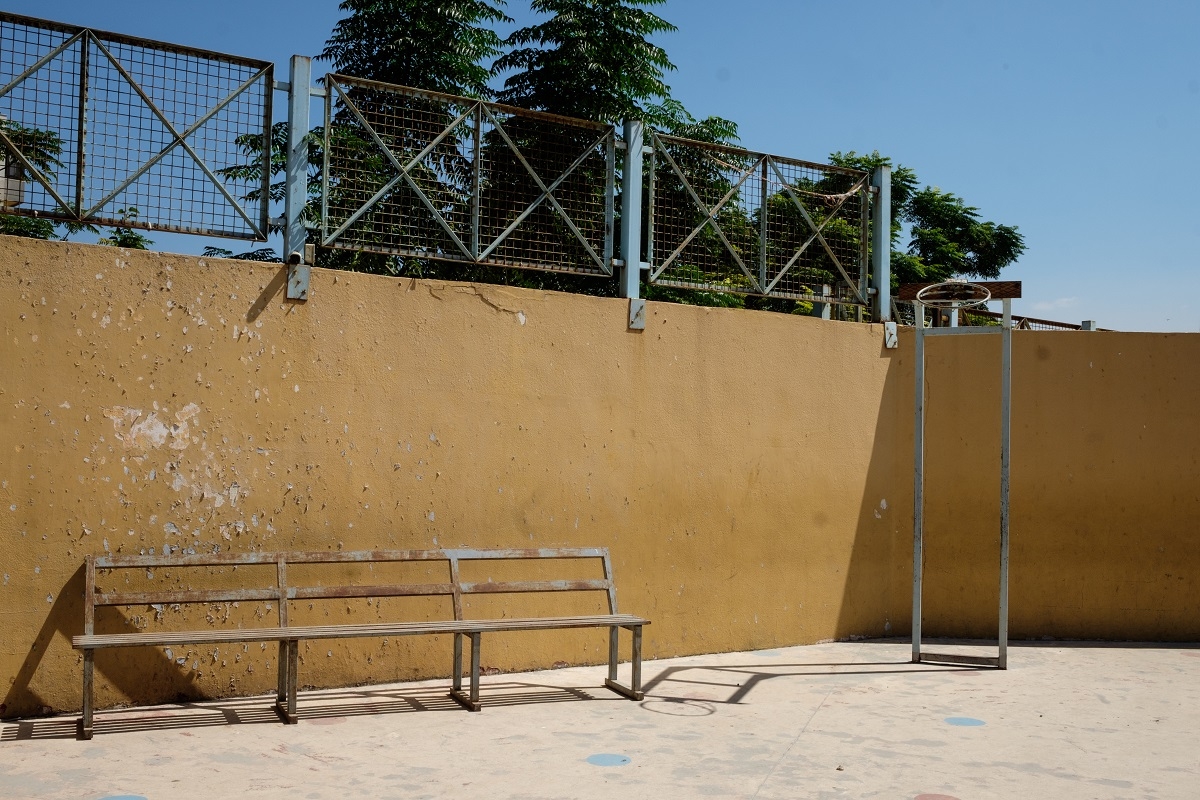
An old bench in the playground of a public school in Tripoli. Lebanon. September 12, 2022. (Rita Kabalan/The Public Source)
Siham Antoun says that “the decrease in operating funding pushed schools to shorten their working hours,” which means that some schools have operated for six hours a day instead of seven, while others even resorted to opening three or four days a week instead of five.
“The schools’ funds, trapped in the banks, are social funds that should not be subjected to capital control,” Antoun adds. “The solution is to take them back from the banks’ control.”
Teachers on the Brink
Adding to an already dire situation, primary and secondary public school teachers have been striking on and off over the past three years, demanding for their salaries to be adjusted to match inflation rates amid the ongoing devaluation of the Lebanese pound, which has lost more than 90 percent of its value since late 2019.
Nisrine Chahine, the president of the Association of Contract and Temporary Teachers, says the average public school teacher’s monthly salary is between L.L. 2.5 and 3.5 million — currently worth less than $100. During the 2021-2022 academic year, the Ministry of Education paid teachers an additional 50 percent of their monthly salary, bringing them up to an average total of 4.5 million per year — not even $120 at the time of writing. The Ministry of Education promised teachers that it would pay them an additional $90 each, but this amount was disbursed in Lebanese pounds at the rate set by “Sayrafa,” the official exchange platform of the central bank, whose conversion rate is usually much lower than the parallel market rate.
“The schools’ funds, trapped in the banks, are social funds that should not be subjected to capital control ... The solution is to take them back from the banks’ control.” —Siham Antoun, secondary school teacher & activist
This also applies to grants the ministry receives from donor states. Because funds come straight into the central bank, beneficiaries can only withdraw funding at disproportionately low exchange rates in Lebanese Lira.
On September 26, parliament finally passed the government budget for 2022, promising to triple public sector employees’ salaries — still falling far short of the pace of inflation.
Chahine, who was recently fired by the ministry in a move that has drawn outrage from her colleagues, says teachers are demanding more.
“We do not want a doubling of our hourly rate; we want the full dollarization of it,” she tells The Public Source. “At least take it back to 1,500 [the pre-2019 exchange rate] and multiply it by 8,000, just like the ministers’ salaries.”
“It is our right to have a monthly wage and to be paid in full,” says Chahine.
Teachers in the public education sector often do not get paid monthly, with salaries sometimes taking up to a year to be deposited into their accounts. Most public school teachers have yet to receive their full salaries owed to them by the government since the last academic year. The school director who requested anonymity says every teacher at their school was giving their all during the last academic year. “If the teachers here did not consider the kids like their own, we wouldn’t have been able to hold classes last year,” they add.
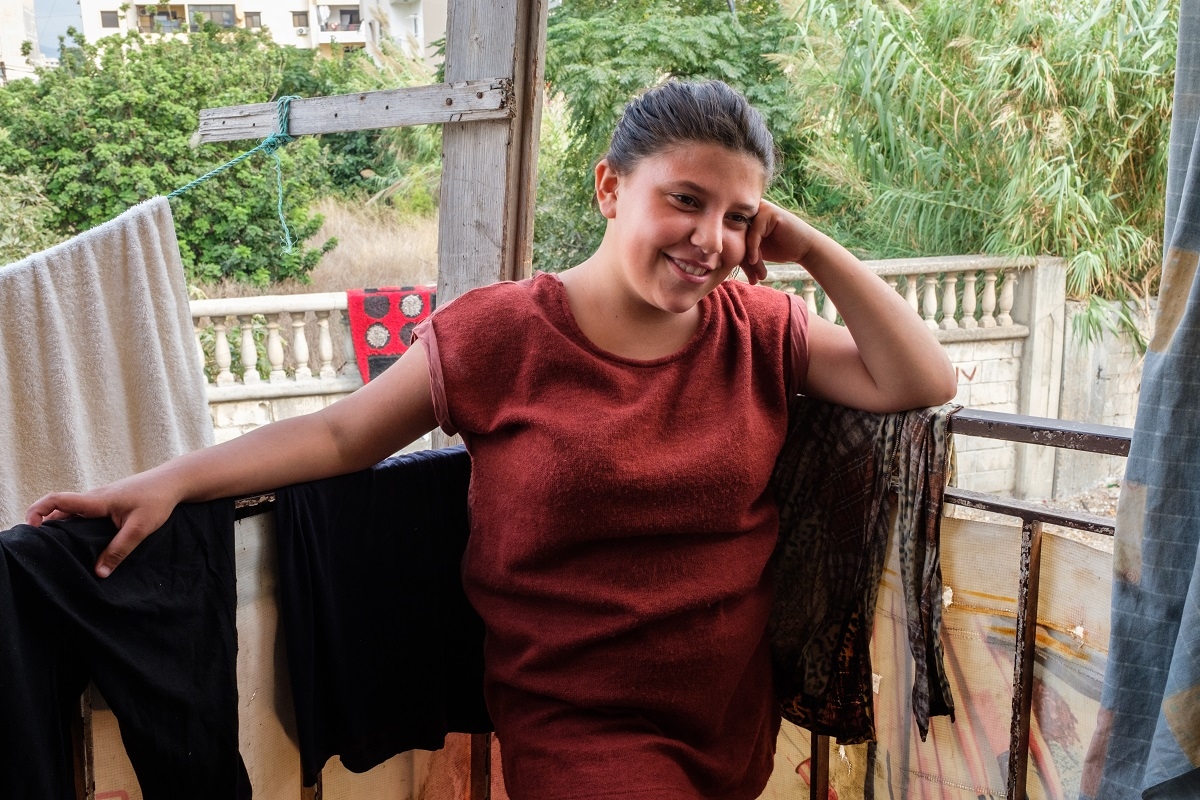
13-year-old Jinane stands on her balcony next to the laundry she helped her mother Gianna do. Tripoli, Lebanon. September 19, 2022. (Rita Kabalan/The Public Source)
As a solution to the many woes plaguing the education system, Education Minister Abbas Halabi has said he is trying to secure funding from abroad to support Lebanon’s teachers.
Donor states, however, have given Lebanon over $1 billion for education between 2017 and 2021, and the Ministry of Education received more than half of this funding.
“Donors have plowed more than a billion dollars of humanitarian aid for education into Lebanon over five years, yet we have seen an unavoidable and worsening education disaster,” Maha Shuayb, director of the Center for Lebanese Studies, told Human Rights Watch.
Forced To Drop Out
In 2019–2020, the preexisting digital divide in the country combined with the economic crisis made it almost impossible for thousands of children to study online during lockdowns, leading many to drop out of school altogether.
“My kids left school two years ago, when COVID-19 started,” says Gianna, 35, a mother of five who lives in Tripoli. “They [the school] asked us to install Wi-Fi and buy tablets, but we couldn’t afford it, so they stopped and never returned.”
Today, two of Gianna’s children work to support the family financially. Mohamad, 12, works alongside his father picking up plastic and scrap metal from trash bins and selling them. The eldest, Fadi, 14, works at a tire shop fixing and changing tires. Meanwhile Jinane, 13, stays at home and takes care of her younger siblings, Ouday, 6, and Ala'a, 2.
Jinane misses school, especially her friends. “I spend my whole day at home. I want to go back to school,” she says, but the economic crisis has turned education into a luxury for many families.
"Twenty-two percent of students have left school, according to a report by the Ministry of Education … and we do not know what they are doing instead." —Simon Abi Ramia, chairman of Youth and Sports parliamentary committee
High fuel prices make transportation expensive and difficult for teachers and students alike, as many live far from the schools they teach and learn in. As global fuel prices have risen, Lebanon’s central bank has gradually lifted the subsidy on fuel until September 2022, when it stopped subsidizing fuel altogether. This has meant the full dollarization of fuel, rendering it even more expensive and inaccessible.
In the last year, Abir, 38, a mother of five, has had to pull all five of her children out of school. She cannot afford the transportation costs, nor has she been able to place all of her children in the same school close to their home.
“[The Ministry of Education] wanted to send each of my children to a different school, and I cannot afford transportation for all of them, so I had to stop sending them to school,” she said. “Everything is so expensive now: food is expensive, fuel is expensive. So I had to pull them out of school.”
On August 29, 2022, MP Simon Abi Ramia, the chairman of Youth and Sports parliamentary committee said in a statement that “22 percent of students have left school, according to a report by the Ministry of Education … and we do not know what they are doing instead.”
Lost Hopes for a Bright Future
Students aren’t holding out hope for the upcoming school year. “Last year, we did not know the situation would be like this. Yes, we were late to start the year, but we did not know it would end up being like this. But this year is looking bad from the start,” Diana says.
“If the situation continues the way it is, there is going to be chaos,” warns Nisrine Chahine of the teachers’ union.
“There are not going to be enough professors for all of the students, the programs are going to be a mess, and nobody knows how many academic weeks the minister is going to assign yet.”
“Over the past four years, children have not acquired necessary skills and competencies ... We are facing what is known as ‘learning loss,’ meaning, for example, a 10-year-old child has probably not acquired the reading and comprehension skills they should have at their age.” —Nehme Nehme, education researcher
The new school year will likely mark the fourth year of interrupted and inadequate education for many children in Lebanon, in violation of their right to education as spelled out in international law signed and ratified by Lebanon in the early 1990s. Under Lebanese law, education is compulsory from six to 15 years old. If children are de facto deprived of four out of these 11 years of education, the result is a generation-wide loss of knowledge and capacities.
“Over the past four years, children have not acquired necessary skills and competencies,” explains Nehme Nehme, a researcher in education at the Centre for Lebanese Studies. “We are facing what is known as ‘learning loss,’ meaning, for example, a 10-year-old child has probably not acquired the reading and comprehension skills they should have at their age.”
“This is on top of the fact that students forgot what they had previously learned because it was never put into practice,” Nehme adds.
When Diana sat for the private school’s entrance exam, she realized that private school students were years ahead of her in many classes, such as physics, math, and chemistry. “I asked some of my friends who are at a private school what they are studying in math, and there are a few lessons that we did not do on complex numbers, calculus (integrals), and probability.”
“They learned so much and we barely learned anything” across 11th grade, she says. “It makes me sad. It makes you feel like you’re uneducated.”
Over the long term, the destruction of Lebanon’s public schools — in tandem with the country’s infamous “brain drain” — will affect the country’s capacity to rebuild its crumbling economy. It is already robbing an entire generation of its ability to imagine a better future, forcing them to cut short their ambitions.
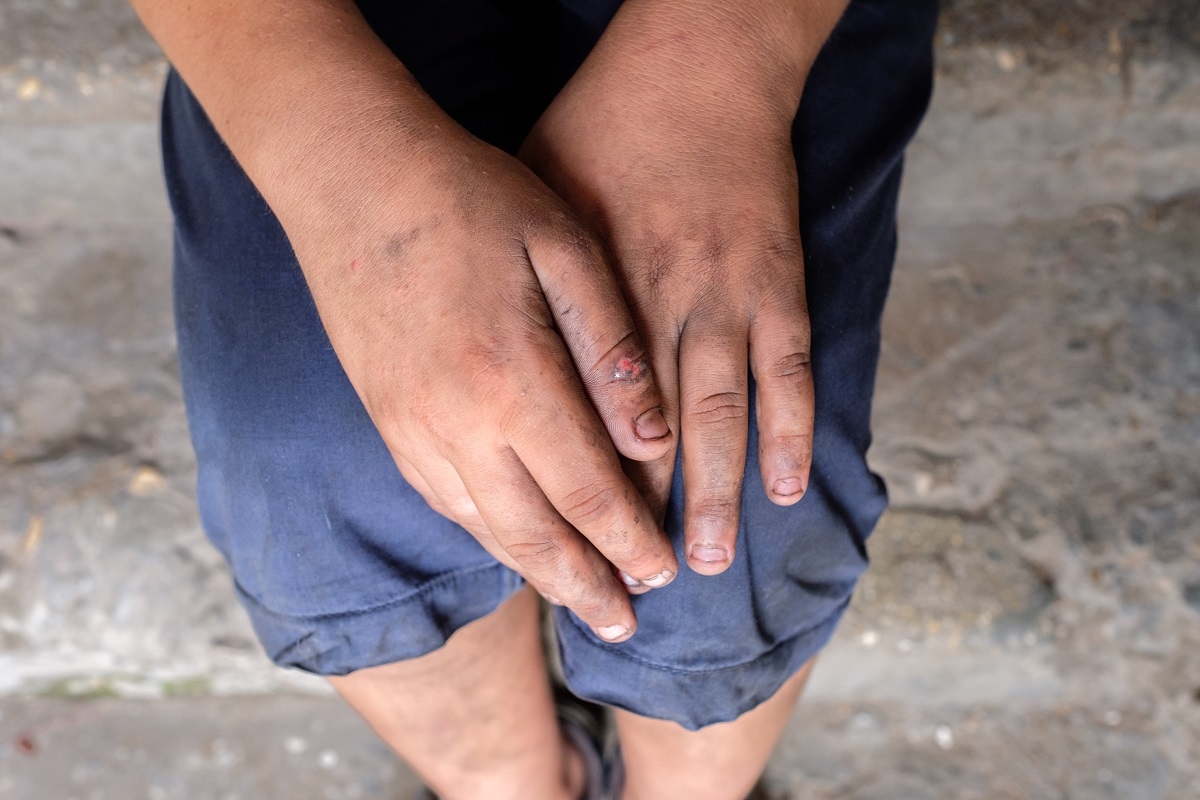
The hands of Fadi, 14, the eldest son in his family of 7, when he comes home from work. He helps fix tires at a nearby tire shop to help support his family. Tripoli, Lebanon. September 19, 2022. (Rita Kabalan/The Public Source)
“I wanted to study medicine, but because of the situation, I can’t afford to go into it,” says Maya. “By the time I finish studying and find a job, it would take a very long time, so I need to do something quicker.”
Manar, 16, is another would-be doctor who has abandoned her dream. Until 2019, she went to the private Lebanese Advance School in Choueifat. But today she is being robbed of her full potential in her final year of schooling at the Burj al-Barajneh Public High School for Girls.
Like Maya, Manar wanted to go to medical school after spending a lot of her youth in and out of hospitals because of a heart condition, and encountering kind and caring doctors who she says saved her life. But because private university tuition costs at least $20,000 per year, and the Lebanese University — Lebanon’s only public university — is also experiencing budget cuts and staff strikes, Manar finds she has no choice but to leave the country: she plans on applying for scholarships and grants abroad.
“I used to have a dream,” she says, longingly. “A few years ago, I was very passionate about it, and I used to read about it and watch videos related to it…. But because of our financial situation, and everything going on with the Lebanese University, it feels like all the doors are closed.”
